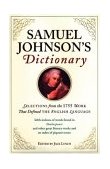|
Since full biographies of Johnson can be hundreds of pages, a brief biography is a challenge, but here we go. His life includes many points worth calling out, but it's a story about overcoming considerable adversity, to ultimately become one of the best known men of his age. He was born in Lichfield, England, on September 18, 1709; his father Michael was a bookseller. Johnson was not a healthy infant, and there was considerable question as to whether he would survive: he was baptized almost immediately. Johnson was scarred from scrofula, thanks to nursing from a tubercular nursemaid; as a result he suffered a loss of hearing and was blind in one eye. During his toddler years, he had an open issue in his arm, to drain fluids. Stop for a moment, and think about a small child being singled out in this way, and what it must have meant. However he wasn't deterred by these infirmities, and there are early tales of his independence. Once, when his babysitter failed to pick him up on time from nursery school, he decided he would get home on his own, crawling on all fours in order to see the gutter and avoid falling in. The babysitter followed at some distance, but when he saw her watching he vehemently protested against her following him. The availability of the books in his father's shop and his natural proclivity for learning contributed to his having extensive knowledge at an early age. When Johnson spent time with an elder cousin, he was exposed to a broad range of thinking and cultivation, of the sort he wouldn't have seen in Lichfield. He later attended Oxford for about a year, but left for financial reasons. His poverty at Oxford was noticed by another student, who left a pair of new shoes outside Johnson's door during the night; Johnson was enraged by this act of charity, as he took it as an insult. Johnson had to leave Oxford for financial reasons, and it must have pained him to see his academic inferiors succeed in an arena where he couldn't. During this period he went into severe depression, but a friend helped him remain productive in spite of it. In 1735, Johnson married Elizabeth "Tetty" Porter, a woman several years older (she was 46, he 25). As a young man, Johnson tried his hand at a career as a schoolmaster, and was unsuccessful-- largely because he didn't have a degree. His ungainly appearance, twitches, and mannerisms made it difficult to maintain the respect of his students. In 1737 he went to London to seek his fortune, and found employment as a writer for various periodicals. He wrote book reviews and derivative biographies, but was also assigned to write thinly disguised reports of the debates in Parliament. (The laws at the time ruled out actual reportage, so Johnson had to write from surreptitiously-taken notes, filling them out in much the same way as a TV movie made today might embellish a skeleton of fact into a drama. The debates were set in a fictional country and the speakers names were altered without being unrecognizeable. The conceit was successful because the government was unwilling to admit to the underlying truth.) Johnson obtained some notice with his works London (1738) and The Vanity of Human Wishes (1749) -- both of which are considered great poems -- but his efforts in the 1750's are part of why he's considered a titan. That decade saw the creation of his Dictionary (1755), his Rambler essays (1750-52), his Idler essays (1758-60), and Rasselas, Prince of Abyssinia (1759). This was a trying decade for him: his wife died in 1752 (just after the cessation of the Rambler essays), and she was often on his mind. Johnson received a government pension in 1762. He was reluctant to accept it, but on accepting the purpose as being for past efforts, and not future efforts, he accepted it. The funds were a significant help, and the periods where he was threatened with debtor's prison were put behind him. In 1763 Johnson met a young Scot named James Boswell in Thomas Davies's bookstore in London, and the two became fast friends. Boswell took notes of their conversations, and leveraged those notes and other material into his mammoth, landmark biography "The Life of Samuel Johnson." (The full title is a bit longer.) Johnson's output included far more than just his output of the 1750's, of course. It also includes a complete edition of Shakespeare; a number of frequently cited political tracts; sermons; a description of his 1773 tour to Scotland with Boswell, with considerable discussion of the change of an era; and a series of biographies of numerous British poets (The Lives of the Poets), commissioned to accompany reprints of each poet's works. Johnson died on December 13, 1784. Boswell's biography was published in 1791, and while it wasn't the first biography of Johnson, it remains a very popular one. For more details, see the Time Line. Back to Top |
|

